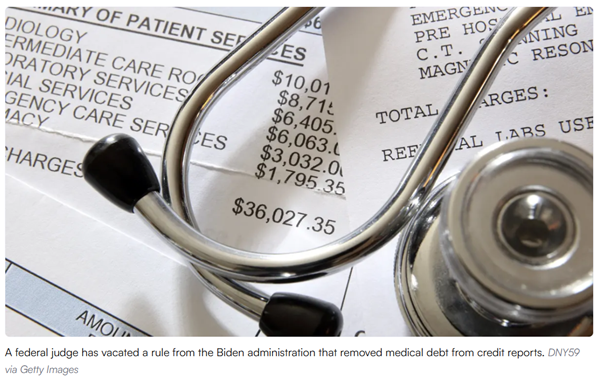Judge nixes Biden-era rule removing medical debt from credit reports
By Rebecca Pifer (Senior Reporter)
July 15, 2025

Dive Brief:
- A federal judge has vacated a rule from the Biden administration that would have removed medical debt from credit reports, in a win for the credit reporting industry.
- Judge Sean Jordan, a Trump appointee, said that the rule exceeded the authority of the Consumer Financial Protection Bureau, an independent agency that’s been carved out by cuts under the Trump administration.
- The CFPB had finalized the rule in January, weeks before former President Joe Biden left office. The Biden administration estimated the regulation, which never went into effect due to legal challenges, would have removed almost $50 billion of medical debt from the credit reports of some 15 million Americans.
Dive Insight:
Two credit reporting trade associations, the Cornerstone Credit Union and the Consumer Data Industry Association, sued to overturn the CFPB’s rule earlier this year. The rule would cut into revenue such groups earn from training providers on how to submit medical debt data to credit reporting agencies.
Credit reporting agencies also argued that the rule would make it hard for lenders to get an accurate picture of a consumer’s financial status in making loan determinations.
The hollowed-out CFPB under Trump declined to defend its regulation in court. Though a group of clinics and individuals with medical debt stepped up as intervening defendants in the litigation, their arguments were unsuccessful in swaying Jordan that the rule should go into effect.
According to the judge, the Fair Credit Reporting Act of 1970 allows reporting agencies to include information about consumers’ medical debt and lenders to consider such information when making credit decisions. The CFPB overstepped in seeking to prevent that, Jordan wrote in his Friday opinion.
The judge’s decision to vacate the rule is a stumbling block for those advocating to reduce the burden of medical debt. More than 100 million Americans struggle with medical debt, which is the largest source of debt in collection across the country, the Biden administration said in January.
Roughly 1 in 12 adults have unpaid medical bills of $250 or above, according to an analysis from the Peterson Center on Healthcare and KFF last year.
The bills can weigh on patients’ credit scores, suppressing financial opportunities, patient advocates say. That’s despite such bills being prone to errors and often the result of one-time medical emergencies, instead of evidence of long-term financial mismanagement.
The rule was part of a larger effort from the Biden administration to crack down on medical debt. A handful of states have also tried to ease the burden of medical debt in recent years, including North Carolina and New Jersey.
“The facts are clear: Medical debt is not …
[READ THE COMPLETE ARTICLE HERE]
